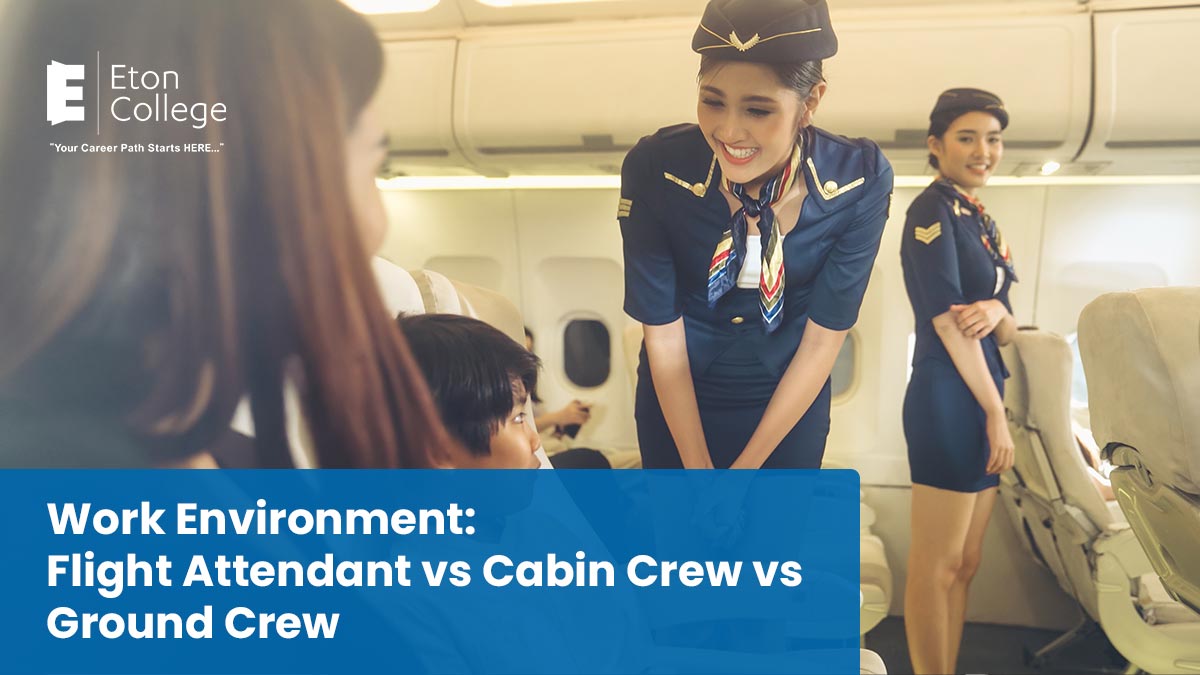- While flight attendants are part of the cabin crew, cabin crew encompasses a larger team, often including senior members who manage the in-flight operations.
- Flight attendants work in the air, ensuring passenger safety and comfort, while ground crew handles passenger needs before and after flights, including check-ins and baggage.
- Cabin crew members, particularly senior staff, manage the overall team operations and coordinate with the pilot during the flight.
- Ground crew members manage pre-flight and post-flight procedures, ensuring that everything is prepared for smooth takeoff and landing.
- Flight attendants are responsible for ensuring the safety and comfort of passengers during flights, managing in-flight services, responding to emergencies, and handling passenger needs.
When considering a career in the airline industry, it’s important to understand the differences between flight attendants, cabin crew, and ground crew. While each role is crucial to the smooth operation of flights, their responsibilities and work environments vary greatly.
In this blog, we’ll dive into the work environment of flight attendant vs cabin crew and flight attendant vs ground crew, highlighting the unique duties, challenges, and benefits of each position.
Flight Attendant vs Cabin Crew: Understanding the Differences
At first glance, it might seem like flight attendants and cabin crew are interchangeable terms. However, there is a subtle distinction between the two.
Cabin crew refers to the team of staff responsible for the safety and comfort of passengers during a flight, which includes flight attendants. Therefore, flight attendants are a part of the cabin crew but do not encompass the entire team. The cabin crew may also include senior crew members who manage the team or provide leadership during flights.
Flight attendants are the ones passengers interact with the most. They perform tasks such as demonstrating safety procedures, serving food and drinks, and responding to passenger needs.
On the other hand, cabin crew members, especially senior ones, ensure that everything runs smoothly within the team. They may also have more managerial responsibilities, such as handling emergencies or coordinating with the pilot.
Flight Attendant vs Ground Crew: Different Roles and Responsibilities
When comparing the roles of flight attendant vs ground crew, it’s clear that these two positions operate in very different environments.
Ground crew, also known as airport staff or ground staff, works on the ground, handling passengers’ needs before and after flights. Their duties include checking passengers in, verifying travel documents, managing baggage, and coordinating boarding. Ground crew is often the first point of contact passengers have with the airline, playing a crucial role in ensuring a smooth travel experience.
In contrast, flight attendants work in the air, providing in-flight services, ensuring passenger safety, and managing emergencies. Flight attendants handle everything from food service to medical situations while onboard.
The key difference between flight attendant vs ground crew lies in the physical setting and timing of their responsibilities. Ground crew works behind the scenes to ensure that flights take off and land smoothly, while flight attendants manage the passenger experience during the flight itself.
Physical Requirements: Flight Attendant vs Cabin Crew vs Ground Crew
When it comes to physical requirements, flight attendants vs cabin crew have specific height and fitness standards they must meet due to the nature of their work. For example, flight attendants need to be able to reach overhead compartments and must adhere to height guidelines set by each airline.
Additionally, they must pass health exams, including vision tests, to ensure they can perform their duties safely and effectively. This is a key difference when considering flight attendant vs cabin crew roles, as fitness and height are critical for in-flight safety operations.
On the other hand, flight attendant vs ground crew comparisons show that ground crew members do not have the same physical requirements. Since their work is primarily on the ground, ground crew can use tools like step ladders to reach high areas and are not subject to height restrictions.
However, the flight attendant vs ground crew distinction becomes clear in terms of physical stamina, as ground crew members often need to lift heavy baggage and spend long hours on their feet, which is essential for both roles in their respective work environments.
Challenges: Flight Attendant vs Cabin Crew vs Ground Crew
Working as a flight attendant vs cabin crew or ground crew member comes with its own set of challenges. For flight attendants, the constant travel, long hours, and time spent away from home can be difficult to manage. They must be able to handle emergencies while staying calm under pressure. When comparing flight attendant vs cabin crew, cabin crew members may face the additional responsibility of managing the team during these stressful situations, adding another layer of complexity to their role.
For ground crew, the challenge lies in the fast-paced environment of the airport. In the flight attendant vs ground crew comparison, ground crew must handle high volumes of passengers, manage luggage, and ensure that flights depart on time, which can be stressful. Ground crew members must work quickly and efficiently while maintaining excellent customer service, a challenge that distinguishes them from their in-flight counterparts in the flight attendant vs ground crew discussion.
Final Thoughts on Choosing the Right Aviation Path
When considering flight attendant vs cabin crew and flight attendant vs ground crew, it’s clear that each role plays a vital part in the airline industry.
Flight attendants work in the air, ensuring the safety and comfort of passengers, while cabin crew members manage the overall coordination of the in-flight experience. On the ground, ground crew ensures that all pre-flight and post-flight operations run smoothly.
Each job comes with its own unique environment, challenges, and rewards, offering a variety of career paths for those interested in aviation.
For those aspiring to become a flight attendant, gaining the right preparation is essential. Eton College offers a comprehensive Flight Attendant Preparation Program, equipping students with the skills and knowledge needed to thrive in this dynamic career. Whether you’re drawn to the skies or prefer working on the ground, proper training is the key to success in aviation.




